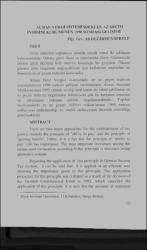Alman Vergi Sistemindeki En Az Geçim İndirimi Kurumunun 1990 Sonrası Gelişimi
Abstract
Vergi adaletini sağlamaya yönelik olarak temel iki yaklaşım bulunmaktadır. Ödeme gücü ilkesi ve yararlanma ilkesi. Günümüzde ödeme gücü ilkesinin hala önemini koruduğu bir gerçektir. Ödeme gücüne göre vergileme sağlayabilmek için kullanılan araçlardan en önemlisi en az geçim indirimi kurumudur.
Alman Gelir Vergisi sistemindeki en az geçim indirimi uygulamasının 1990 sonrası gelişimi incelenmiştir. Alman Anayasa Mahkemesinin 1992 yılında verdiği iptal kararı ile tekrar şekillenen en az geçim indirimi uygulaması Almanya'da çok bu kurumun önemine ve etkinliğine yakışan şekilde uygulanmaktadır. Yapılan incelemelerde en az geçim indirimi miktarlarının 1990 sonrası enflasyona ezdirilmediği ve sürekli enflasyonun üzerinde arttırıldığı görülmektedir. There are two main approaches for the establishment of tax justice, namely the principle of "ability to pay" and the principle of "getting benefit". Today, it is a fact that the principle of "ability to pay" stili has importance. The most important instrument among the means used for taxation according to this principle is minimum living allovvance concept.
Regarding the application of this principle in German Income Tax System, it can be said that it is applied in an efficient way showing the importance given to this principle. The application procedure for this principle was reshaped as a result of the decision of the German Constitutional Court in 1992, vvhich cancelled the application of this principle. It is seen that the amounts of minimum living allovvance have alvvays been above the inflation rate since 1990 in Germany.
Source
Sosyal Bilimler DergisiVolume
1Issue
1Collections
- Cilt 1 : Sayı 1 [20]



















